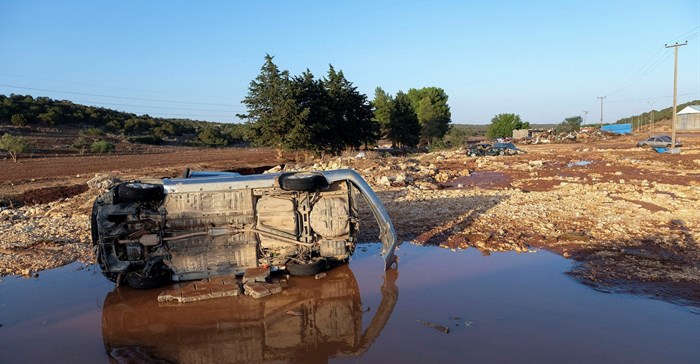
Derna, in eastern Libya, was wrecked when storm waters overwhelmed two dams sending a torrent through the city centre early on Monday, 11 September and sweeping whole districts into the sea.
It is not yet clear whether crumbling infrastructure or decisions by the authorities contributed to the disaster and the huge loss of life, put in the thousands. But risks facing the city were flagged long before disaster struck.
An academic published a paper in 2022 said that repeated flooding threatened the dams built in a wadi, a usually dry riverbed, above the city and urged immediate maintenance.
"If a huge flood happens the result will be catastrophic for the people of the wadi and the city," wrote hydrologist Abdelwanees A. R. Ashoor of Libya's Omar Al-Mukhtar University.
Residents, whose trust in any authority had long been eroded by years of fighting and disputes, also said there was confusion about how to respond when Storm Daniel drenched the area.
"Some areas received instructions to evacuate, but some people didn’t respond," resident Mustafa Salem said, without giving details about who sent the instructions.
Libya has had no government with a nationwide reach since a 2011 uprising that toppled longtime autocrat Muammar Gaddafi. Rival factions have splintered the country, cities were pitted against each other and state funds diverted by corruption.
After 2014 the country split between rival administrations in east and west. Despite a ceasefire since 2020 and some efforts to unify, Libya remains politically divided.
Between the national problems and the more local ones, "it feels like Derna is one of the least equipped to deal with such a tragedy," said Tim Eaton of Chatham House in London.
Few places in Libya have emerged unscarred from conflict that has swept the whole nation, but Derna was particularly badly hit by fighting since 2014 and by its seizure by Islamic State militants, who were then ousted by rival jihadist groups.
When eastern commander Khalifa Haftar's Libyan National Army (LNA) took control of the city in 2019, many Derna residents said the advancing forces punished both jihadists and ordinary townsfolk, said Libya analyst Jalel Harchaoui.
The continued tense relationship between Derna residents and the LNA with its leadership in Benghazi was exposed when eastern authorities postponed planned municipal elections after reported confrontations between pro-Hafter activists and their opponents.
"Derna is seen in Benghazi as a source of trouble," Harchaoui said.
National divisions contributed to Derna's problems too.
Foreign governments recognise the Government of National Unity (GNU) in Tripoli but not the administration in the east that picked Libya's national parliament in Benghazi.
Although many governments have official contacts with Haftar and the eastern-based parliament, Libya's divisions mean there are rival layers of officialdom when dealing on a national level, including when sending aid.
There are, however, some institutions that operate across the political divide. The Central Bank of Libya in Tripoli has paid state salaries and funded some state bodies across frontlines, even at the height of the conflict.
And a 2020 ceasefire that followed the most recent major bout of fighting ended internal restrictions on travel. Libyans can drive or fly without hindrance between Tripoli and Benghazi.
But eastern factions have long complained they do not get a fair share of Libya's oil wealth. Although the government in Tripoli has tapped state funds for some reconstruction, there has been little evidence of development in the east.
The High Finance Committee established this year with members from across the political divides is meant to ensure wealth is distributed fairly. But many ordinary Libyans say corruption will stop wealth filtering down.
Libya's factional leaders deny engaging in graft themselves, but often level the same accusation at rivals.

Reuters, the news and media division of Thomson Reuters, is the world's largest multimedia news provider, reaching billions of people worldwide every day.
Go to: https://www.reuters.com/